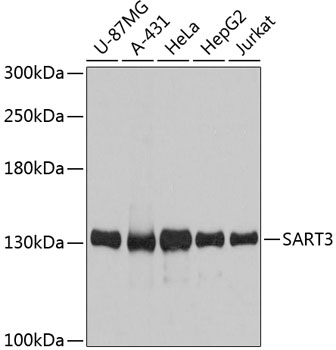Anti-SART3 Antibody (CAB12124)
- SKU:
- CAB12124
- Product type:
- Antibody
- Reactivity:
- Human
- Host Species:
- Rabbit
- Isotype:
- IgG
- Antibody Type:
- Polyclonal Antibody
- Research Area:
- Epigenetics and Nuclear Signaling
Frequently bought together:
Description
| 抗体名: | Anti-SART3 Antibody |
| 抗体コード: | CAB12124 |
| 抗体サイズ: | 20uL, 50uL, 100uL |
| 申し込み: | WB |
| 反応性: | Human |
| 宿主種: | Rabbit |
| 免疫原: | Recombinant fusion protein containing a sequence corresponding to amino acids 664-963 of human SART3 (NP_055521.1). |
| 申し込み: | WB |
| 推奨希釈: | WB 1:500 - 1:2000 |
| 反応性: | Human |
| ポジティブサンプル: | U-87MG, A-431, HeLa, HepG2, Jurkat |
| 免疫原: | Recombinant fusion protein containing a sequence corresponding to amino acids 664-963 of human SART3 (NP_055521.1). |
| 精製方法: | Affinity purification |
| ストレージバッファ: | Store at -20'C. Avoid freeze / thaw cycles. Buffer: PBS with 0.02% sodium azide, 50% glycerol, pH7.3. |
| アイソタイプ: | IgG |
| 順序: | AGPA GKCA AVDV EPPS KQKE KAAS LKRD MPKV LHDS SKDS ITVF VSNL PYSM QEPD TKLR PLFE ACGE VVQI RPIF SNRG DFRG YCYV EFKE EKSA LQAL EMDR KSVE GRPM FVSP CVDK SKNP DFKV FRYS TSLE KHKL FISG LPFS CTKE ELEE ICKA HGTV KDLR LVTN RAGK PKGL AYVE YENE SQAS QAVM KMDG MTIK ENII KVAI SNPP QRKV PEKP ETRK APGG PMLL PQTY GARG KGRT QLSL LPRA LQRP SAAA PQAE NGPA AAPA VAAP AATE APKM SNAD FAKL FLRK |
| 遺伝子ID: | 9733 |
| Uniprot: | Q15020 |
| セルラーロケーション: | Cajal body, Cytoplasm, Nucleus, Nucleus speckle, nucleoplasm |
| 計算された分子量: | 13kDa/41kDa/105kDa/109kDa |
| 観察された分子量: | 130kDa |
| 同義語: | SART3, DSAP1, P100, RP11-13G14, TIP110, p110, p110(nrb) |
| バックグラウンド: | The protein encoded by this gene is an RNA-binding nuclear protein that is a tumor-rejection antigen. This antigen possesses tumor epitopes capable of inducing HLA-A24-restricted and tumor-specific cytotoxic T lymphocytes in cancer patients and may be useful for specific immunotherapy. This gene product is found to be an important cellular factor for HIV-1 gene expression and viral replication. It also associates transiently with U6 and U4/U6 snRNPs during the recycling phase of the spliceosome cycle. This encoded protein is thought to be involved in the regulation of mRNA splicing. |
| UniProt Protein Function: | SART3: a ubiquitously expressed protein in proliferating cells. A component of the 7SK snRNP complex composed of P-TEFb (composed of CDK9 and CCNT1), HEXIM1, HEXIM2, BCDIN3, SART3 proteins and 7SK and U6 snRNAs. Transiently associates with the U6 and U4/U6 snRNPs during the spliceosome cycle, helping to regenerate functional U4/U6 snRNPs complexes. Expressed in the nucleus of all of malignant tumor cell lines tested and the majority of cancer tissues with various histologies, including squamous cell carcinomas, adenocarcinomas, melanomas and leukemias. However, this protein is undetectable in the nucleus of nonmalignant cell lines or normal tissues, except for the testis. Expressed in the cytoplasm of all proliferating cells, including normal and malignant cells, but not in most cells of normal tissues, except for the testis and the fetal liver. Regulates Tat transactivation activity through direct interaction. May be a cellular factor for HIV-1 gene expression and viral replication. 3 isoforms of the human protein are produced by alternative splicing. |
| UniProt Protein Details: | Protein type:Nuclear receptor co-regulator; RNA-binding; Transcription regulation Chromosomal Location of Human Ortholog: 12q23.3 Cellular Component: Cajal body; nucleoplasm; nucleus; U4/U6 x U5 tri-snRNP complex Molecular Function:histone binding; protein binding; RNA binding; U4 snRNA binding; U6 snRNA binding; U6atac snRNA binding Biological Process: assembly of spliceosomal tri-snRNP; nuclear mRNA splicing, via spliceosome; nucleosome assembly; regulation of gene expression; spliceosomal snRNP biogenesis Disease: Porokeratosis 3, Disseminated Superficial Actinic Type |
| NCBI Summary: | The protein encoded by this gene is an RNA-binding nuclear protein that is a tumor-rejection antigen. This antigen possesses tumor epitopes capable of inducing HLA-A24-restricted and tumor-specific cytotoxic T lymphocytes in cancer patients and may be useful for specific immunotherapy. This gene product is found to be an important cellular factor for HIV-1 gene expression and viral replication. It also associates transiently with U6 and U4/U6 snRNPs during the recycling phase of the spliceosome cycle. This encoded protein is thought to be involved in the regulation of mRNA splicing. [provided by RefSeq, Jul 2008] |
| UniProt Code: | Q15020 |
| NCBI GenInfo Identifier: | 74762140 |
| NCBI Gene ID: | 9733 |
| NCBI Accession: | Q15020.1 |
| UniProt Secondary Accession: | Q15020,Q2M2H0, Q58F06, Q8IUS1, Q96J95, A8K2E4, B7ZKM0 |
| UniProt Related Accession: | Q15020 |
| Molecular Weight: | 110kDa |
| NCBI Full Name: | Squamous cell carcinoma antigen recognized by T-cells 3 |
| NCBI Synonym Full Names: | squamous cell carcinoma antigen recognized by T-cells 3 |
| NCBI Official Symbol: | SART3 |
| NCBI Official Synonym Symbols: | P100; p110; DSAP1; TIP110; p110(nrb); RP11-13G14 |
| NCBI Protein Information: | squamous cell carcinoma antigen recognized by T-cells 3 |
| UniProt Protein Name: | Squamous cell carcinoma antigen recognized by T-cells 3 |
| UniProt Synonym Protein Names: | Tat-interacting protein of 110 kDa |
| Protein Family: | Squamous cell carcinoma antigen |
| UniProt Gene Name: | SART3 |
View AllClose


